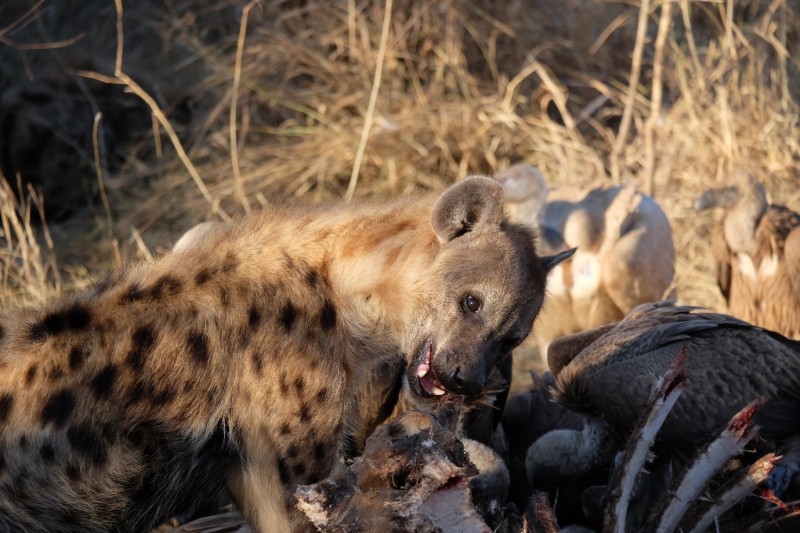Species on the Move Conference - 2019
Katie Cook
University of Leeds

With the help of the Challenger Society Travel Award I attended and presented at the conference ‘Species on The Move 2019’ which was held from 22nd-26th July in Kruger National Park, South Africa. The interdisciplinary conference brought together scientists and natural resource managers working across the fields of global change, biogeography, biodiversity management and conservation and theoretical ecology. My Ph.D research is on predicting climate induced range shifts in Japanese subtropical to tropical marine ecosystems to improve conservation management so Species on The Move provided an excellent opportunity to meet some of the top researchers in my field.
Although my Ph.D research is based on data from Japan, a lot of the research on range shifts in subtropical ecosystems is conducted in Australia. It was great to meet and network with the researchers doing very similar work to me, and attending their presentations was interesting as I was able to learn and understand the contrasts between how climate change is affecting the two regions differently. Hopefully I will be able to visit these research groups in the future to learn new skills and develop my work further.
Throughout the week, I was also able to attend many exciting talks which were full of novel ideas from different research areas. I have attended two other conferences in the past, but these were based around coral reef research, so I enjoyed the interdisciplinary aspect of this conference. All the talks felt directly relevant to my work, regardless of whether the study species were plants or animals that lived in marine or terrestrial areas.
My presentation was at the end of the week, so I was able to present to familiar faces that I had met throughout the conference. I am not a natural public speaker, but I feel that every time I present to a large audience I get a little more comfortable, so I was grateful of this opportunity to improve my presentation skills. My talk went well, and I was met with some good thought-provoking questions, and suggestions and ideas for further research.
In terms of the social aspects, from the get -go this conference was pretty special, starting with a day long scenic tour from Johannesburg airport to Kruger National Park, where we got to see some beautiful scenery, stop for a traditional lunch and have a tour guide explain the history of the areas we were driving through. When we arrived at the park gate we immediately saw a herd of elephants, and a giraffe in the short drive through the park to the conference centre in Skukuza rest camp. We arrived just in time for the welcome function, where we ate a South African Braai (barbeque) whilst watching local dancers perform. Throughout the week, the food was excellent, and we got to sample many local delicacies of the area. There were organised sunset safaris and optional sunrise safaris where I saw so many exciting animals, including buffalo, hippos, baboons, warthogs and so many more! The week culminated in a bush braai where we driven in safari vehicles to an outdoor area lit by lanterns (and guarded with armed guards due to the wild animals!) where we had an amazing traditional meal with some more local dancers.
All in all I had a fantastic week in Kruger National Park at Species on the Move 2019, with so many exciting and relevant talks, as well as organised events with a friendly atmosphere. With the ice breakers of ‘What animals have you seen this week?’ and ‘Are you going on safari later’ there was great opportunities to network and I was able to meet lots of new peers, and inspiring researchers who I’m sure I will meet again through future conferences and collaborations. Species on The Move has set the bar very high for conferences to come.
I am a second year Ph.D candidate at the University of Leeds. My research focuses on modelling how climate change will affect Japanese tropical and subtropical marine ecosystems. The east coast of Japan is strongly influenced by the oceanic Kuroshio current, which brings warm water from the equator to high latitudes, and this current is predicted to strengthen in the future. Coupled with increasing sea temperatures due to climate change, this is causing marine species to shift their ranges northwards, as they track their ideal environmental conditions.
Latest News
Royal Society Publishing Photography Competition 2025
Please see a message from the Royal Society below:
We are delighted to announce that the 2025 Competition is now open for entries until 15 August for a chance to win £1000! The competition celebrates the power of photography in conveying the wonder of science happening all around us and photographs can be submitted in the categories of: Astronomy, Behaviour, Earth Science and Climatology, Ecology and Environmental Science, and Microimaging.
The competition is free to enter and open to anyone studying or working in science at graduate level or above. Category winners will receive a one-year membership to the Royal Photographic Society and the overall winner will receive a grand prize of £1,000. Find out more: https://bit.ly/RSPphotocomp
October 2025 MEDIN Workshop: Marine Data Management, Governance and the MEDIN toolset
The Marine Environmental Data and Information Network (MEDIN) are pleased to announce that registration is now open for the next occurrence of our popular free online training workshop: ‘Marine Data Management, Governance and the MEDIN toolset’ on the 13th – 17th October 2025 on OceanTeacher Global Academy.
Marine Data Management, Governance and the MEDIN toolset
The Marine Environmental Data and Information Network (MEDIN) and OceanWise are delighted to invite you to attend our popular free online training workshop: ‘Marine Data Management, Governance and the MEDIN toolset’ on the 19th – 23rd of May 2025.
